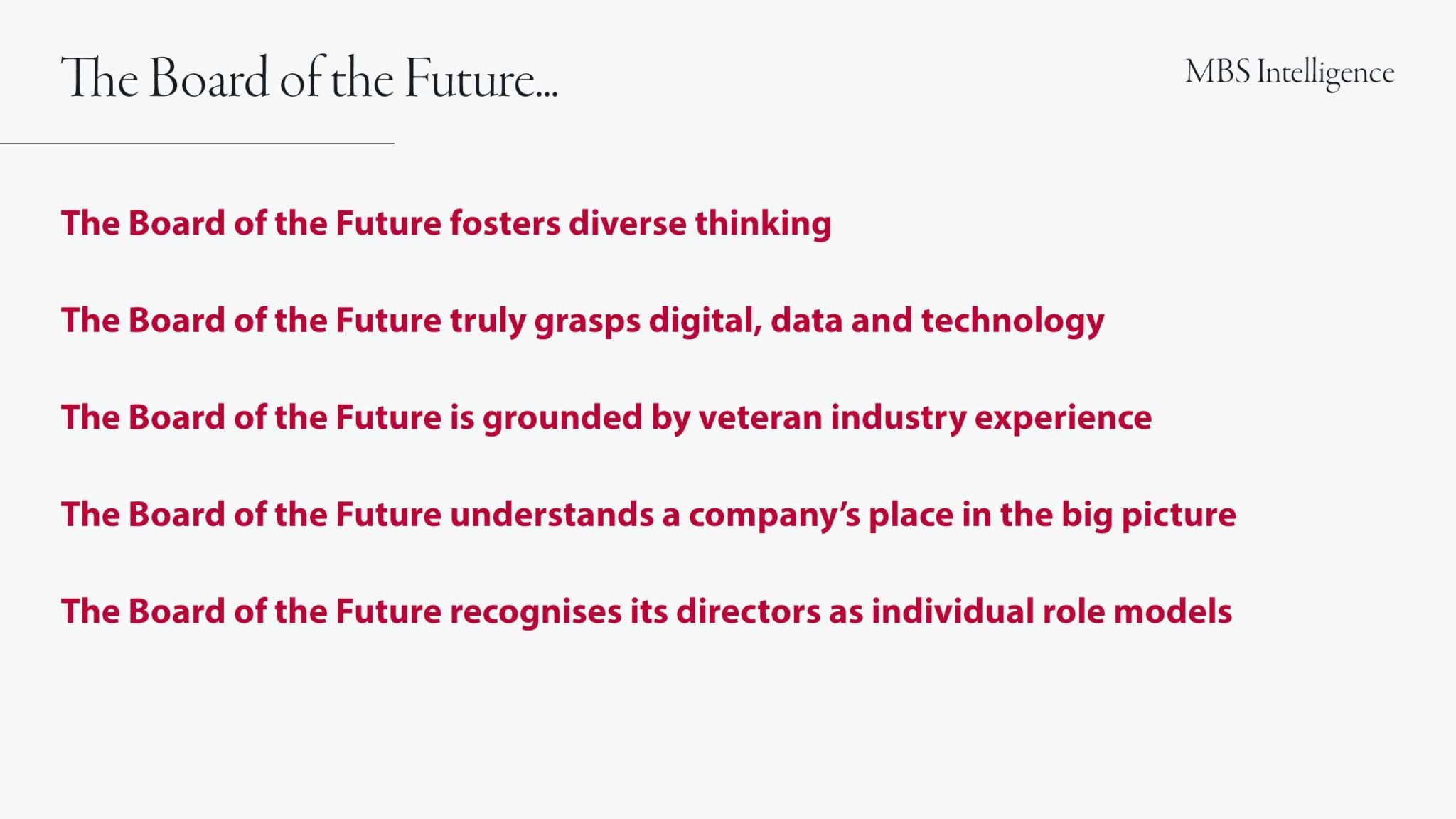Regular readers of this column – and pretty much anyone who has met me in the last few years – will be familiar with my passion for what I call the Boards of the Future, and the story about how it came to be. It was 2017, and I had just challenged Chairs to put a millennial on their Board. Why, I asked, do so few Boards include someone under 35 when that group can offer such valuable insight and provide so many fresh perspectives, particularly about how young consumers interact with brands and retailers differently?
Five years later, and my philosophy has evolved into two reports: a manifesto, detailing the optimum Board composition, and a comprehensive analysis, which measures if UK Boards are changing in a way that will make them fit for the future.
Based on conversations with over 100 Chairs during lockdown, my manifesto established five pillars on which I argue the Board of the future should be built:

In order to foster diverse thinking, Chairs need to think differently about who they include around the table. My vision has evolved far beyond just ensuring millennial representation, but age diversity remains critical to a successful board – not least because of young people’s growing purchasing power and their rapidly evolving customer expectations.
Integral to achieving this is appointing first-time non-executive directors. In our research conducted earlier this year, we found that UK Boards are doing just this. Of all new appointments to the FTSE 350 in 2021, nearly 40% were first-time non-executive directors. Positively, this cohort is also diverse: 53% are women, with representation from more than 18 nationalities.
Ever since we established this finding, I have been determined to bring together some of these first-time non-executives, to understand what their experience has been. And so, at the beginning of this month, it was a real delight to do so, at a lunch hosted by MBS and Chaired by Lord Stuart Rose, Chair at Asda, EG Group and Zenith Automotive.
It was a truly diverse group of leaders: around the table were former tech CEOs, those with decades of experience in the transport sector, clinical leaders from healthcare, as well as NEDs from some of the biggest companies in our consumer-facing industries.
Held in the beautiful Postillion Room at the Langham Hotel in London, it was a privilege to convene a group of more than a dozen first-time non-executives from across the FTSE 350. It was a truly diverse group of leaders: around the table were former tech CEOs, those with decades of experience in the transport sector, clinical leaders from healthcare, as well as NEDs from some of the biggest companies in our consumer-facing industries.

Over the course of the afternoon, the group swapped stories and shared experiences of sitting on the Board for the first time. It was a particular honour to hear from Stuart, who kicked off the discussion. Acknowledging the challenges of an uncertain and fast-changing macro environment, he highlighted the importance of Boards taking a flexible approach to business planning – for example describing a plan that one of his Board’s had signed off that morning as “the 3rd of November plan, which might change in a month’s time”. Stuart offered valuable advice to those at the beginning of their portfolio career and reflected on his own transition to the Board thirty years ago. Also sharing his views on the role of the Chair, a phrase that stuck with me was this: “You’ve got to find a way to ensure that one plus one plus one equals more than three.”
“You’ve got to find a way to ensure that one plus one plus one equals more than three.” – Lord Stuart Rose, Chair at Asda, EG Group and Zenith Automotive.
Having reflected on the wider discussion, I am keen to share five key themes that stood out to me:
Take your first steps into non-executive directorship cautiously and purposefully
A central theme in the discussion was the importance of joining a Board that you are genuinely passionate about and are able to add value. Indeed, it’s vital that those looking to make the switch do not simply jump at the first non-executive opportunity. And those who are not enjoying their role on a Board once they have joined should cut their losses and make a swift exit for both their own sake and that of the business.
There was a strong sense that any serving executives looking to take on their first external NED role, but whose current companies are unsupportive of such a move, should persevere. The case for broadening your own experience is strong not only for one’s personal development, but also for the fresh perspective it allows you to bring back into your day job.
Listen up before speaking out
Perhaps counterintuitively for most executives who are at the top of their game, new NEDs are at the start of a new journey and as such should feel comfortable with their own silence. While they absolutely should speak up if they have something to say, more often than not it is best to observe and listen in the early stages.
Astute NEDs take their time, they seek external advice where useful and they do not feel the need to speak at every Board meeting.

Build meaningful relationships on the Board and beyond
If it is not already forthcoming, new NEDs should actively seek feedback from their Chairs to ensure they contribute in the best possible way. The most successful Boards generally tackle potentially contentious issues outside the boardroom, so it is vital for you to be able to get your points across in the right forum. That said, NEDs need to guard against undue influence from their peers.
New NEDs should also invest time with the company’s executives – with the Chair and/or CEO’s awareness – to ensure they have a complete picture and can add true value to the conversation.
Take a non-executive career one step at a time
Adding a NED position alongside an executive role can bring immense benefits to the individual and both companies, and it need not precipitate an immediate move to ‘going plural’. Individuals should make that switch when it feels right for them, rather than feel any pressure to take on more Board roles. Likewise, there need be no rush to seek a Chair role.
Those who are on a Board and feel it is going well should generally commit to two terms, particularly as they will really be adding the most value in that second term.
Have an open mind to ownership structures
There was a feeling in the room that the regulatory commitments on a listed Board opened up questions around the risk/reward ratio – as we discussed in a recent column comparing the experience of NEDs in the US and UK – and several guests were actively considering taking up private equity-backed board positions.
The magic of boards is that they are comprised of individuals who bring more than the sum of their parts to bear on the governance and oversight of a business. As I left the discussion, I felt optimistic about the new talent spreading influence across corporate Britain and beyond – as well as excited to meet the next cohort of first-time NEDs.








